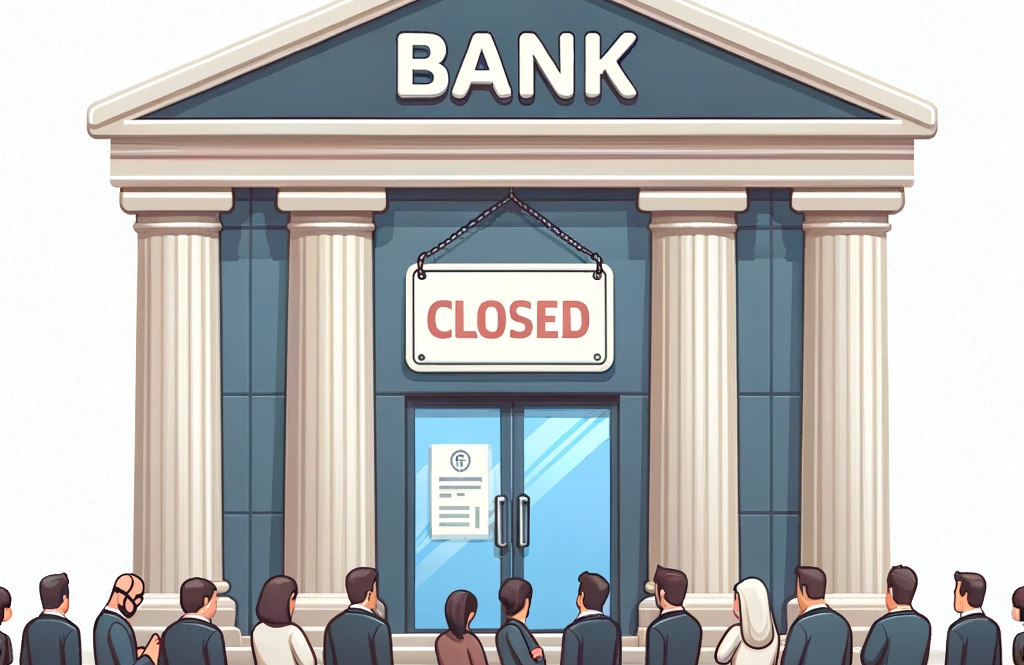Capital Controls: A Reaction to the Cryptocurrency Surge?

It is the year 2023, and the global financial landscape is witnessing unprecedented shifts. With a slew of banking crises and skyrocketing debt, trust in the traditional banking system is waning.

Cryptocurrencies, with Bitcoin at the forefront, have rapidly gained traction, offering a tantalizing alternative to the conventional banking model. This shift towards decentralized currency has ignited concerns among banks, leading to reactionary measures, such as limiting withdrawals, exacerbating the public's dwindling confidence.
Understanding the Threat
At the heart of the crypto revolution lies its decentralized nature. Unlike fiat currencies, which are issued and regulated by central banks, cryptocurrencies operate outside of this centralized framework. This decentralization, while liberating for many, also presents a significant threat to the traditional banking sector.
Central banks are accustomed to having control over monetary policies and the issuance of currency. Cryptocurrencies, being decentralized, strip away this control, causing trepidation among these institutions.
The traditional financial world, as we know it, has been meticulously orchestrated around central banks. These institutions have been the cornerstone of global economies, wielding considerable power in dictating monetary policies, controlling interest rates, and issuing or retracting currency based on a nation's economic needs. Their decisions influence everything from national inflation rates to the purchasing power of an individual's wallet.
Enter cryptocurrencies: a paradigm-shifting concept built on decentralized technology, primarily blockchain. Their rise challenges the very ethos of central banking in several fundamental ways:
- Decentralization: Cryptocurrencies operate on a decentralized model, meaning no single entity has control over them. This runs counter to the centralized model of traditional banking, where a select group of decision-makers can influence monetary policies.
- Loss of Control Over Monetary Policy: Central banks use monetary policy as a tool to influence an economy. They can adjust interest rates or change the amount of money in circulation to either stimulate economic growth or curb inflation. Cryptocurrencies, by their very nature, aren't beholden to such policies. For instance, Bitcoin has a fixed supply, and no central authority can change this to influence its value.
- Transparency and Autonomy: Cryptocurrencies offer a level of transparency and autonomy previously unseen. Every transaction is recorded on a public ledger, the blockchain, which anyone can view. This transparency is in stark contrast to the often opaque operations of central banks.
- Global Nature: Cryptocurrencies don't recognize national borders. They can be sent and received anywhere in the world, undermining the concept of national currencies and the control central banks have within their specific jurisdictions.
- Potential to Undermine Traditional Banking: If a significant portion of the population starts adopting cryptocurrencies, the need for traditional banks might diminish. People might prefer to 'be their own bank', storing their assets in digital wallets rather than traditional bank accounts.
- Fear of Unknown: The rapid evolution of cryptocurrency technology and its potential implications are not fully understood, even by experts. This fear of the unknown, combined with the potential risks associated with digital assets, can cause apprehension among traditional institutions.
In essence, the emergence of cryptocurrencies represents a potential redistribution of power from central banks to individuals. It offers a future where financial control is democratized, and individuals have greater autonomy over their assets. While this is empowering for many, it's a scenario that central banks, accustomed to having a significant influence over financial matters, find deeply unsettling.
The tug-of-war between the old and the new is palpable, and the world watches with bated breath as this financial drama unfolds. One thing to keep in mind this will transition will probably take far longer then expected but when it does the magnitude will be far bigger then you could expect.
Peering into the Future
he dawn of a decentralized world could herald a new age of financial freedom, empowerment, and transformation. As we move away from the centralized systems that have governed our lives for centuries, here's a vision of what might lie ahead:
- Empowered Individuals: In a decentralized world, individuals would no longer be dependent on banks or financial institutions to manage their money. With personal digital wallets, people would have full control over their assets. This empowerment would extend to making investments, transferring money globally without exorbitant fees, and having a transparent view of all transactions.
- Globalized Financial System: The concept of national currencies could become obsolete. Instead, a few major cryptocurrencies could become the de facto means of trade, allowing for smoother international transactions without the hindrance of exchange rates or tariffs.
- Smart Contracts & Automated Transactions: The future might see the rise of "smart contracts" – self-executing contracts with the terms directly written into code. These could handle everything from rental agreements to complex business deals, executing terms automatically and transparently, reducing the need for intermediaries.
- Transparent Governance: Decentralized systems could lead to more transparent governance models. With blockchain's ability to record every transaction, governments might adopt this technology for everything from voting systems to public finance, ensuring accountability and reducing corruption.
- Challenges to Taxation: With money flowing seamlessly across borders and individuals having more control over their assets, governments might find it challenging to tax incomes and transactions in the traditional way. This could lead to a rethinking of taxation models, perhaps shifting more towards consumption-based taxes.
- Decentralized Banking Models: Traditional banks might evolve into service providers, offering value-added services atop the blockchain. They might focus more on advisory roles, helping individuals navigate the complex world of decentralized finance.
- Potential Risks: While decentralization offers many advantages, it's not without risks. Cybersecurity threats could become more pronounced, and without central authorities, resolving disputes or recovering lost assets might become more challenging.
- Societal Shifts: On a societal level, decentralization might reduce wealth disparities as more people gain access to global markets and opportunities. However, it could also lead to a digital divide, where those without access to technology are left behind.
- Rethinking Trust: With transactions becoming more transparent, the concept of trust might shift from institutions to technology. People might place more faith in cryptographic proofs and algorithms than in bank managers or government officials.
- Environmental Implications: The environmental impact of cryptocurrencies, particularly proof-of-work models like Bitcoin, will need addressing. The future might see a shift towards more eco-friendly consensus mechanisms or entirely new technological solutions.
In conclusion, the transition to a decentralized world promises a profound transformation of our financial systems, societal structures, and individual behaviors. While filled with opportunities, this future also presents challenges that will require careful navigation. As with any significant shift in human history, adaptability, foresight, and collaboration will be key to ensuring that the benefits of decentralization are realized for all.
A Glimpse at Global Capital Control Status
Various countries have responded to the financial shifts in diverse ways, with some implementing capital controls or monitoring large withdrawals.
- Switzerland: In the early stages of staggering withdrawals.
- Greece: Ended its capital controls implemented in 2015.
- Cyprus: Concluded its capital controls from 2013.
- Argentina: Still enforces its withdrawal limits set in 2020.
- Venezuela: Continues with its withdrawal limits.
- Lebanon: Maintains its informal capital controls.
- Iceland: Ended its post-2008 capital controls.
- India: Ended its demonetization phase from 2016.
- Spain & Italy: Actively monitoring large withdrawals.
Conclusion: Embrace Financial Autonomy
The evolving financial landscape underscores the importance of taking charge of one's finances. By understanding the dynamics of both traditional and crypto banking, individuals can make informed decisions, ultimately paving the way to becoming their own bank.


